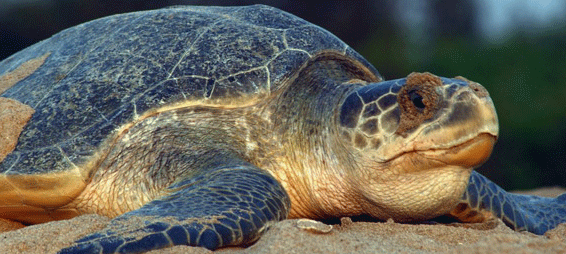Bhubaneswar: It is anticipated that this year there might be buffer nesting of the turtles along Odisha coast.
The scientists opined that as per the natural behavior of the turtles, nesting of more number of sea turtles are expected.
The scientists like Dr K. Sivkumar of Wild life Institute of India and Dr Priyambada Mohanty ( Hejmadi) said “Odisha has contributed significantly towards preservation and growth of this endangered species. Odisha model for conservation of the species has been applauded in international forums”.
Chief Secretary S C Mahapatra chaired a meeting and has directed the departments of forest and environment, fisheries and animal resource development, police, marine police, coast guard and port authorities on Odisha coast to have concerted efforts at the ground level in conservation and nurturing of the Olive Ridley as a precious treasure of the nature.
He said, “As we have earned more experience and State is investing large amount of money for the purpose, we must deliver best in saving this species for the world community”.
Mr.Mahapatra also directed to ensure strict enforcement of the conservation rules along the nesting coasts. The Coast Guard was requested to have real time intelligence sharing with the departments about any illegal fishing.
The institutions like DRDO, Dhamara Port, Gopalpur Port and Paradeep port authorities were requested to follow the black-out practices and light deeming to save turtles from possible delusion. They were asked to provide necessary support for joint patrolling in the sea and berthing of the vessels.
Mr. Mahapatra also directed to actively involve all other stake holders, NGOs and local community in this task.
Additional Chief Secretary Forest and Environment, Mona Sharma outlined the issues for discussion in the meeting held on digital mode.
Dr Sharma appraised that “four wildlife divisions of the State namely Bhadrak, Rajnagar, Puri and Berhampur are in readiness for conservation operations this year. These divisions have been equipped with 5 numbers of high speed boats, along with 13 trawlers and support boats for chasing the illegal activities in the sea. PCCF Wild life Dr Sashi Paul appraised that last year around 3.5 lakh turtles laid eggs in Gahiramatha coast. Thirty eight trawlers were seized and 202 persons were arrested. Mass nesting took place at Gahiramatha between 10 March to 24 March.
Secretary Fisheries and Animal Resource Development, R. Raghu Prasad said “ In the meanwhile a mobile app has been developed for the fishermen and the officers at the ground level. The fisherman can see the no fishing zone in the app itself. They will also get an alert message when they enter to the no fishing area”.
Chief Secretary directed all officers engaged in the conservation operation to download the app for asserting location of the fishing boats.
It was decided that the regional conservator of forests would monitor the operations in their respective jurisdiction in close coordination of district administration, police and other concerned departments. One central monitoring unit would be set up in office of the Chief Wildlife Warden. It was also decided that operations would start from 1November, 2021 and would continue up to May, 2022. Fishing by motorized vessels / trawlers and mechanized techniques would be banned within 20 kms from the specified coast of the sea comprising sea turtle congregation area and their buffer zones in 3 river mouths namely Dhamara river mouth, Devi river mouth and Rusikulya river mouth.
Wide awareness activities would be undertaken for the purpose. There would be circle level monitoring mechanisms under the direct supervision of Regional Conservator of Forests (RCCF), Bhubaneswar, Berhampur and Baripada. Berthing places would be set up at Barunei, Gupti, Sasanapeta and Krushnapriyapur and Rajnagar for safe custody of the seized vessels.
A total number of 66 petroling camp sites including 61 on-shores and 5 off-shore camps would be operate round the clock. Each camp would be provided with VHF communication devices, mobile phones and required camping materials. There would be regular communication and intelligence sharing among coast guard, patrolling ship, and various camps and marine police.
Armed police force would be deployed for patrolling and enforcement activities. Sporadic nesting activities of the turtles and their mortality would be monitored through a web portal under the title ‘manage.odishawildlife.org’. Soon after mass nesting, the rookeries would be fenced to protect the nests and eggs. Patrolling along with watch and ward activities would be strengthened further.


